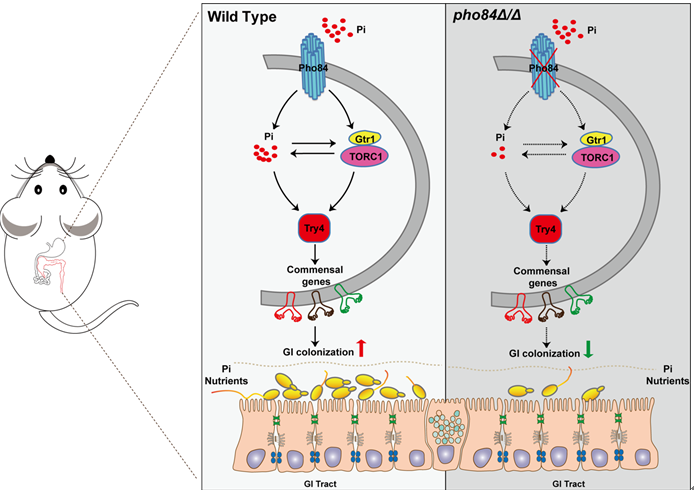In the study published in the journal Cell Reports on January 25, entitled Fungal commensalism modulated by a dual action phosphate transceptor, Prof. CHEN Changbin’s group at the Center for Microbes, Development and Health, Institut Pasteur of Shanghai of the Chinese Academy of Sciences, together with Prof. LIU Ningning’s group at the Shanghai Jiao Tong University School of Medicine, reported a unique, nutrient-dependent regulatory mode governed by the dual action phosphate transceptor Pho84 in promoting gastrointestinal colonization of fungal commensals.
Among the multiple nutrients available in the human body, phosphate (Pi) is essential for numerous cellular events, particularly ATP generation, membrane organization and nucleic acid synthesis. Microorganisms like Candida albicans, who usually colonizes as a commensal on the mucosal surfaces of the gastrointestinal (GI) tract in healthy individuals and becomes pathogenic when host-microbiota homeostasis is disrupted, develop sophisticated systems for absorption of scarce Pi from the host environment to promote their cell metabolism and survival. However, it is still unclear how this fungal commensal senses environmental nutrients and integrates such environmental inputs into a regulatory program to promote its gut commensalism.
Here, CHEN Changbin and LIU Ningning’s teams uncovered a unique and conserved function of Pho84 involving the dual activity of the phosphate transportation and TOR activation conjugate that significantly contributes to C. albicans colonization in the GI tract.
More importantly, the combinatorial activity of Pho84 was only functional in promoting gut commensalism of C. albicans but not its pathogenicity. Furthermore, the signals of Pho84 are found to be received by a downstream transcription factor Try4, where the two functions of Pho84 converge to regulate the expression of genes required for fungal commensalism.
Hence, their studies improve the current understanding on how C. albicans senses nutritional environments and integrates such environmental inputs into a regulatory program to promote gut commensalism when adapting to the host microenvironment. Pho84, through an uncharacterized, nutrient-dependent regulatory module, acts to balance the commensal-pathogen transition of C. albicans in its mammalian host and shape the tripartite interactions among nutrition, gut commensals and host immunity that facilitate fungal commensalism.

A schematic model illustrating the mechanism underlying the dual action activity of Pho84 in promoting GI commensalism of C. albicans. (Image by IPS)
Contact
CHEN Changbin
Institut Pasteur of Shanghai, Chinese Academy of Sciences
E-mail: cbchen@ips.ac.cn
Reference: Fungal commensalism modulated by a dual action phosphate transceptor

